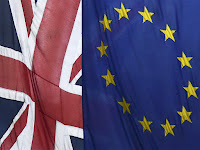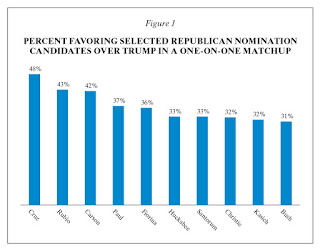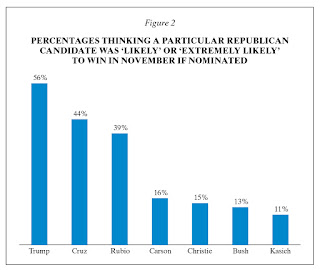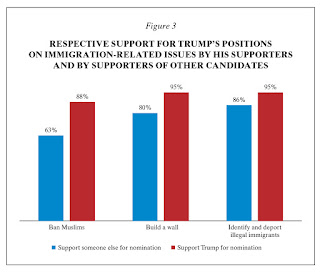(* 16 episodes were re-recorded for BBC 4 radio and available online. Strongly recommended for those who like politics and British comedy.)
Tuesday, June 28, 2016
Why Did the UK Enter the EU in the First Place?
Mish Shedlock. investment advisor and blogger, questions on his blog Mish Talk why the UK entered the EU in the first place (with thanks, Mish.) He makes some interesting points, but really hilarious is his reference to a clip from the 1980s BBC TV series, “Yes Minister”.*
Yes Minister: Why Britain Joined the European Union
(* 16 episodes were re-recorded for BBC 4 radio and available online. Strongly recommended for those who like politics and British comedy.)
(* 16 episodes were re-recorded for BBC 4 radio and available online. Strongly recommended for those who like politics and British comedy.)
Why Trump Was Inevitable
In a recent article Why Trump Was Inevitable in The New York Review of Books, the political scientists Ronald B. Rapoport, Alan I. Abramowitz, and Walter J. Stone give - finally, as I've been waiting for this quite some time - a thorough analysis why Trump has become the Republican Presidential nominee, and why by January 2016 already he was inevitable to win. I recommend this article to get a better understanding why Trump's rise was inevitable. I will limit myself to showing three figures from this article, that each speak volumes to Trump's candidacy and his views. They are based on a survey commissioned by The New York Review of Books and carried out by YouGov of a national sample of 1,000 Republicans and independents:
These figures clearly imply that Trump was by far the strongest among the Republican candidates, notwithstanding the "anyone but Trump" movement; that Republicans and Independents believe that Trump is the only Republican candidate likely to win in November; and that Trumps controversial views on immigration, the Mexican wall and Muslim visitors to the US, obviously not only are strongly supported by Trump's supporters, they are also strongly supported by supporters of his Republican competitors. In other words, Trump's views may be much more acceptable among American Republicans and, more importantly, among Independents than the main stream media and establishment voices believe. If Trump's rise to Republican nominee was inevitable, what about his chances for the elections?
These figures clearly imply that Trump was by far the strongest among the Republican candidates, notwithstanding the "anyone but Trump" movement; that Republicans and Independents believe that Trump is the only Republican candidate likely to win in November; and that Trumps controversial views on immigration, the Mexican wall and Muslim visitors to the US, obviously not only are strongly supported by Trump's supporters, they are also strongly supported by supporters of his Republican competitors. In other words, Trump's views may be much more acceptable among American Republicans and, more importantly, among Independents than the main stream media and establishment voices believe. If Trump's rise to Republican nominee was inevitable, what about his chances for the elections?
Saturday, June 25, 2016
Brexit: de teloorgang van de "deskundigen"
 |
| bron: Burgercomite EU |
Minstens zo verrrassend als deze uitslag was dat alle zogenaamde deskundigen fout zaten in hun voorspellingen en analyses: niet alleen zaten de opiniepeilers fout - weer, zoals ook afgelopen jaar bij het Schots onafhankelijkheidsreferendum en ook tijdens de vele Republikeinse voorverkiezingen van Donald Trump -, maar ook de Britse bookmakers en de financiele markten. Zij allen bleken niet in staat om het onverwachte te verwachten.
Na de tragische moord op de Britse parlementarier Jo Cox, een week voor het Brexit referendum van 23 juni, lieten de peilingen, die eerst een Brexit meerderheid verwachten, een ommekeer zien. Bremain zou de meerderheid verkrijgen. Op de nacht voor het referendum verwachtte The Financial Times Brexit poll tracker een Bremain winst van 48% - 46%.
FT Brexit poll tracker
De immer alwetende financiele markten lieten op maandag 20 juni ook een ommezwaai zien. Na weken van lagere standen en pessimisme, gingen plots de koersen omhoog in de verwachting dat "Bremain" zou winnen.
Daarnaast bereikte ook het gokken, het favoriete Britse tijdverdrijf, nieuwe hoogten, aldus een artikel in Business Insider,:
Friday, June 24, 2016
Brexit: Exit the "Experts"
 |
| source: Burgercomite EU |
What was equally surprising was that all the self proclaimed "experts" were wrong in their predictions and forecasts: not only professional pollsters were wrong again - see for example last year's Scottish independence referendum or the continuous miscalculations of Donald Trump's wins in the US Republican primaries -, but also the British bookmakers and the financial markets. They all were unable to expect the unexpected.
Since the tragic murder of British MP Jo Cox last week, just a week before the Brexit referendum of June 23, the already very tight polls that had been edging towards Brexit, suddenly reversed and showed a majority for Bremain. On the night before the referendum, The Financial Times Brexit poll tracker showed a 48% - 46% Bremain majority.
| FT Brexit poll tracker |
The almighty financial markets in their wisdom also changed their tune on Monday June 20 as they rebounded after weeks of pessimism and down-markets and became upbeat till Thursday believing a Bremain vote was imminent, as described in Market Rallies as Brexit fears wane (CNN, June 20, 2016)
Then, UK's favorite pastime, betting, went crazy as it appears from this article in Business Insider,:
Subscribe to:
Comments (Atom)




